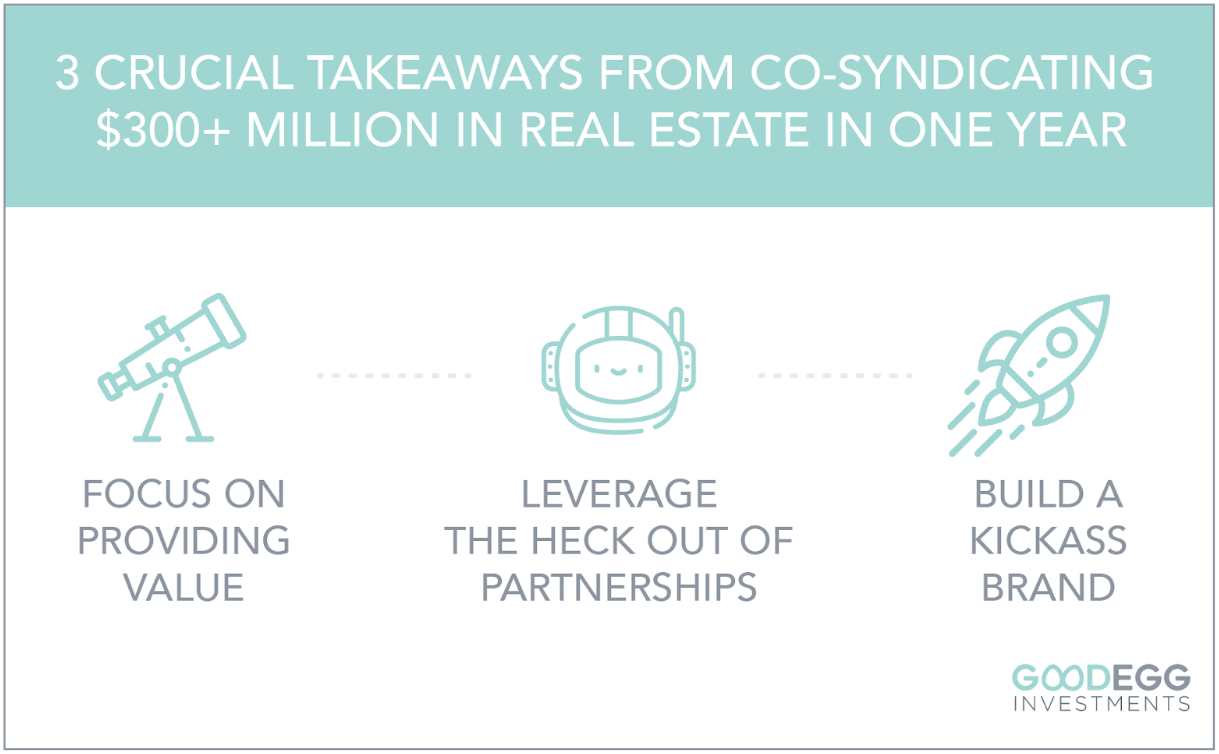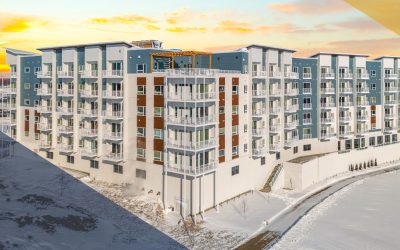[The following is a guest post by Annie Dickerson, co-founder of Goodegg Investments, which focuses on helping busy people invest in cash-flowing real estate that impacts local communities, all without the hassles of being a landlord.]
I never set out to be a real estate investor. In fact, when my husband became a real estate agent several years ago, I swore off real estate and crossed it off my list of potential career paths. After all between the house, the kids, and the Netflix account, it seemed like we were sharing enough.
But, Life has a funny way of poking fun of your so-called plans, and that’s exactly what happened. Nowadays, not only am I a full-fledged real estate investor, but I have also co-founded a real estate investing company to educate, empower, and connect other real estate investors to great investment opportunities around the country.
In this article, I’ll share my journey from accidental landlord to real estate entrepreneur, as well as a behind-the-scenes look at our company, Goodegg Investments, how we have grown our portfolio to over $300 million in assets under management in under one year, and three crucial lessons we’ve learned along the way.
Accidental Landlords
It was by complete accident that my husband and I even became real estate investors in the first place. Back when we were young and naive, we set out to buy our first home. Lusting after trendy urban living, we set our sights on a condo. Ah, those high ceilings and open floor plans. Enough to make any fresh college grad swoon.
However, our realtor casually floated the idea of buying a duplex instead. Not quite as sexy, sure, but he said that if we played our cards right, we could get it to be cash flow positive. I didn’t know exactly what that meant at the time, but putting the words “cash flow” and “positive” together seemed pretty darn sexy to me.
Hence began our journey into real estate investing. Over the ensuing years, we would go on to invest in number of other small multifamily properties. We were playing real life Monopoly, and it was fabulous.
The Road to Syndication
As we continued to invest, friends and family became interested in getting in on some of our deals.
Lots of BiggerPockets threads, podcast binges, and Googling later, I slowly began to realize that real estate syndications (i.e., group investments) might be the solution. I could do the work of acquiring and managing the assets, my friends and family could invest their money as passive investors, and we could all share in the profits together. Win-win.
The more I learned about syndications, the more I realized how few people knew about them. I mean, I had been investing in real estate for ten years before I first learned about syndications, and even then, it was only because I sought out the information myself.
Real estate syndications were the perfect way for people who wanted to build passive income and wealth through real estate, but who didn’t want to deal with the hassles of being a landlord, to invest their money into cash-flowing properties that could make an impact in local communities.
So, why the heck weren’t people lining up around the block to invest in them?
The problem, as I learned, was that, in the past, SEC regulations prohibited syndicators from publicly advertising these investment opportunities. Because of this, syndication investment opportunities were known by and made available mainly to wealthy folks with deep pockets, which is why no one in my circles ever knew about or told me about real estate syndications.
Thus, we set out to change that.
Goodegg Investments Is Born
Goodegg Investments was created to help spread the message about what real estate syndications are, why they are so great for building passive income and long-term wealth, and how anyone with money to invest can invest in these opportunities.
At Goodegg, our focus is on providing robust investor education, finding great syndication deals with great partners in great markets, and, once we’ve vetted the deals and partners, connecting our investors with those investment opportunities.
We do things a little differently than other real estate syndicators, and I’d like to give you a peek behind the scenes, through the lens of three important takeaways we’ve learned in building up our business:
- Focus on providing value, first and foremost
- Leverage the heck out of partnerships
- Build a kickass brand with a strong why

#1 – Focus on Providing Value, First and Foremost
Syndicating a commercial real estate deal is hard, y’all. There are brokers to schmooze, financial models to analyze, sometimes hundreds of units to walk, and, of course, funds to raise. There are some magical people who can do all that and not break a sweat. I bow down to them. Seriously.
But, we’re not those people. At least, not yet. Early on, we made the conscious choice to focus on where we could provide the most value, rather than trying to do everything ourselves.
My background is in education, and both my co-founder and I have looked at tons of deals, through our individual investing, so we can find the nuances between good deals, bottom-of-the-barrel duds disguised as good deals, and the rare unicorn deals.
Thus, we’ve been able to leverage our knowledge and expertise to educate our investors and help connect them to great investment opportunities. We invest right alongside our investors, so we’re able to lead them through our thought process when evaluating a deal and answer the questions they didn’t even know they had.
By focusing on areas where we can provide the most value, rather than just pitching our deals, we’ve been able to attract a sizable and loyal following of investors, we’re able to operate within our zones of genius, and we’ve been able to grow our business quickly and efficiently.
#2 – Leverage the Heck out of Partnerships
People always think real estate is about houses and buildings, but in actuality, real estate is all about people. Real estate syndications are no different.
As a company, Goodegg Investments is still in its infancy. We created the company less than six months ago, and we’ve been able to co-syndicate seven deals within that time, growing our portfolio to over $300 million in assets under management.
I’d like to tell you that we did it all ourselves, because we’re cool like that, but we’re real estate investors, not magicians.
The only way we’ve been able to grow so fast, in such a short amount of time, is through the power of partnerships. Rather than trying to take on every aspect of a syndication ourselves, we’ve focused in on the parts we do best, and we leverage our sponsor and operator partners to focus on the parts they do best.
This requires self-awareness, humility, and vulnerability. Self-awareness and humility to identify your areas of strength versus weakness, and vulnerability to make that information available to others and to seek out those partnerships.
I’m not going to lie; partnerships are not all rainbows and cupcakes. But, when you put in the work to find and maintain the right partnerships, that’s when the real magic can happen.
#3 – Build a Kickass Brand with a Strong Why
In all the money we’ve raised, all the investors we’ve talked to, and all the blog articles and videos we’ve published, the most valuable asset, by far, has been the brand we’ve built.
Just as Simon Sinek says, “People don’t buy what you do, they buy why you do it.”
There are tons of syndicators out there doing great deals, and our investors could choose to invest with any of them. But the reason that our investors stick by us, invest with us time and again, and laugh at our corny jokes, is because everything we do originates from our Why.
You see, my co-founder and I are both working moms, and we initially got into passive investing and real estate syndication because we found it to be such a great way to build passive income for our families, so we could work less and spend more time with our kids while they are still little.
Investing passively in real estate syndications has allowed us to live life on our terms, now rather than decades down the road, and Goodegg is our effort to help others do exactly the same thing – invest wisely, build passive income, and live the life they’ve always wanted.
Our target audience are other working moms, like ourselves, who want to build passive income for their families. By identifying our Why, and by niching down, we’re able to build traction and clarify our message, thereby more deeply resonating with our audience.
Having that clarity in our niche and our Why affects every aspect of our business. Instead of formal bios and pictures of hard-edged skyscrapers, our website and marketing materials are filled with color, photos of our families, and wholesome and organic imagery.
Instead of loading our articles with real estate jargon, our articles are filled with real world examples, funny stories, puns, and simple language (I can’t tell you the number of times I’ve typed a phrase like “capital injection,” only to delete it and type “put in more money” instead).
The Goodegg brand is not just about our logo. It’s about everything that our logo represents. Every email we send, every blog post we publish, every Facebook comment we respond to. It all emanates from our Why, and it all feeds into the brand and the community we’re continually building.
Recap
At the core, these three things have enabled the growth of Goodegg Investments:
- Focusing on providing value, first and foremost
- Leveraging the heck out of partnerships
- Building a kickass brand with a strong why
Our focus on helping others, becoming part of the larger ecosystem, and clarifying our message has helped us to gain traction and to better serve our customers.
We’ve been on a crazy journey the last several months, and our business has grown beyond our wildest expectations. We’re incredibly grateful for our investors, our partners, our support network, and all those people who randomly stumbled upon our website and have taken a chance on us. We aim to continually improve so that we can help more people achieve financial freedom through real estate and ultimately, to change the world, one investment at a time.





